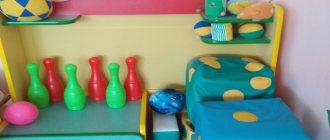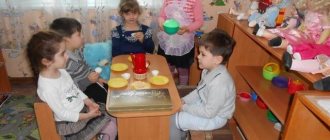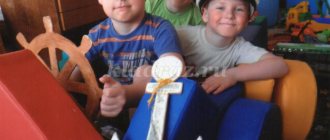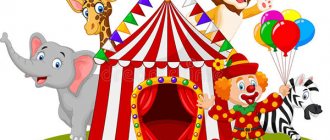Levels of role-playing play: from 3 to 7 years
The main indicator of the development of the game is its sequence: the beginning of the process, the culmination and the logical conclusion. Observing children during activities helps adults notice behavioral deviations at an early age and make efforts to eliminate them. Child psychologists find a relationship between the child’s age, his level of development and the complexity of play activities:
- 3-4 years. Mostly kids play with adults, whose help at this stage is quite significant. Parents come up with a plot, hold an imaginary situation, guide the children and provide guidance. Children often try to play on their own, but such activities are usually short-term and limited to a couple of actions: wash the dishes, put the doll to bed, feed the teddy bear. The plot does not unfold further - no one eats, no one praises them for clean plates, and no one wakes up. At this stage, the game should teach children to act according to the script, develop imagination and enrich their vocabulary.
- 4-5 years. From this age, children begin to master simple plot directions in which they try on various images: a mother, a sister, or a doctor from a children's clinic. They actively interact with toys, talking for themselves and for them. At this age, children can already join groups (2-3 people) for joint activities. The company helps 4-5 year old players develop communication skills, teaches how to conduct a dialogue, independently distribute responsibilities and select toys.
- 5-6 years. The main focus of the game is the relationships between people, whose roles the children distribute among themselves. Toys are selected to match the invented scenario. The everyday theme is complemented by work activities and significant events in life. Must be consistent with the character and actions of the assigned role. While playing, the child develops the ability to determine the rules and change the plot, activates dialogical speech, enriches his social experience (learns the rules of behavior on the road, in transport, cafes, shops, etc.)
- 6-7 years. At this stage, children act meaningfully, aware of their relationships with partners. While playing out scenes, they jealously monitor their friends’ compliance with generally accepted rules: “Dads don’t act like that,” “Dinner doesn’t start with the second course,” “Girls don’t behave like that”—such phrases are often heard in the company of older preschool-age children. Creative role-playing games with exciting plots, content, new characters, and a fairy-tale world come to the fore. The children themselves prepare the scenery and attributes, select toys, and add elements of dance and singing to the scenes.
Play is the leading activity of a preschooler and occupies an important place in his life. Children are transported from everyday routine to an imaginary situation, try on interesting roles, use images and imagination to act in the play space. At this time, adults receive in their hands a powerful tool for influencing the child’s future inclinations, his actions and character. You can read about the benefits of wooden toys in the article “Wooden educational toys: features and benefits for children.”
We learn by playing...
I'll digress a little. I recently read the idea that through story-based fun, children unnoticed even learn the laws of physics, chemistry, mathematics, history, and biology. In addition, preschoolers learn the intricacies of psychology, ethics, and culture.
It sounds far-fetched, but it's actually true. We just don’t formulate formulas and rules in the game, don’t focus on scientific facts, and don’t force children to take notes on the knowledge they have acquired.
Isn't building a building out of cubes and striving to achieve structural stability just physics? Or we divide the cake equally among all the dolls - what’s wrong with mathematics?
Don't laugh and consider me a naive idealist. I operate with scientific data, read the relevant literature and see for yourself. Play is the most important thing a child needs besides food, clothing, and parental care.
But you shouldn’t get ahead of yourself and suggest that a two-year-old child play at being an astronaut, for example. Let everything take its course, all that is required of us is to provide ideas for interesting things to play.
The tasks of the simplest role-playing children's games in the younger group should correspond to the level of children's mastery of the features of socializing fun. We, educators, have assistants - methodological literature, CDs and knowledge acquired at universities that help us not make mistakes in planning educational activities.
In the photo this is a small part of what I use in my educational work, I really like the disks, lesson notes in some of them can be printed out or the lesson itself can be changed in your own way by adding your thoughts to the notes, after which this lesson is saved on the same disk. Again I ran away from the topic)))
For parents who are raising children at home or want to do extra work with their child without relying on kindergarten, I advise you to find special manuals about play. Remember that you need to take into account the child’s age when choosing a new plot for role-playing fun.
If children under 3 years old only need the ability to get involved in the process, use objects, toys, and try to build a plot, then from older preschoolers we expect a full-fledged life scene with dialogues, roles, rules, imaginary and real actions.
The tasks of the classic plot-role socializing game in the middle preschool group are, accordingly, more complex, but not as complex as in the preparatory group.
What tasks are solved through role-playing events?
Educational: we introduce you to the world of professions, teach the simplest skills in using various tools and objects. We give an idea of collective communication, tolerance, teach how to interact, empathize, and care for others.
Developmental: we try to encourage children to organize themselves to play together, come up with rules together, think through moves and roles. We promote full-fledged role interaction and the assimilation of new role relationships.
Educational: we instill positive qualities, develop skills for independent and fair resolution of conflicts and disputes, develop habits of helping others, enjoying successes, and experiencing other people’s failures. We are trying to establish friendly relations in the team.
What results do we expect when solving problems of various plot-based creative games, for example, in a senior group?
- We hope that the children will be able to apply the skills they have developed in real life situations.
- They will be able to adequately evaluate the actions of their comrades and their behavior during the plot fun.
- They will develop self-confidence, initiative, expand their creative interests, and love communicating with peers.
- They will establish relationships with classmates and improve their position in the team.
- They will find a “golden mean” in communication during joint activities and develop positive qualities in themselves.
So, I tried to tell you what, in fact, the tasks of a children's story game are known to me as a teacher. Do you think I succeeded? There may be additional information that I have not disclosed. Please share your thoughts and experiences.
If you liked the materials, subscribe to new articles, and also share links with colleagues on social networks.
Sincerely, Tatyana Sukhikh
See you again!
By the way, I recommend reading:
Recommendations for parents
It is difficult for a small “producer” to come up with an interesting plot in the first stages. He has not yet sufficiently mastered the world in which adults live. During this period, it is necessary to help the baby, show how and what to play. The variety of plots, their duration and emotional intensity will depend on the parents’ imagination. When organizing entertainment for adults, you need to follow several rules:
- Don't force. If the child is not in the mood or he was simply planning to put together a picture from puzzles, there is no need to start building a spaceship. First you need to ask whether the baby wants to do this and only after receiving consent can he begin to take active action. At the first sign of loss of interest, it is better to stop the activity.
- Don't force yourself into rigid boundaries. Let the child show his imagination and contribute to the development of the plot.
- Create a friendly atmosphere. Leave aside the strict intonations, irritation and authoritarian manners; they are completely unnecessary here. Play on equal terms, or better yet take on secondary characters: a patient in a clinic, a disheveled model in a hairdresser; incompetent road user. Guide your child’s actions slowly, gradually, so that he doesn’t feel it.
Role-playing activities not only entertain, but are also an element of the educational process that allows you to understand the laws by which people live. In addition, they instill in the younger generation communication skills and help them become independent individuals, ready to overcome any adversity in life. More interesting information about toys and children's development can be read on our blog.






